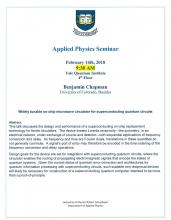Widely tunable on-chip microwave circulator for superconducting quantum circuits
Benjamin Chapman - University of Colorado
This talk discusses the design and performance of a superconducting on-chip replacement technology for ferrite circulators. The device breaks Lorentz reciprocity—the symmetry, in an electrical network, under exchange of source and detector—with sequential applications of frequency conversion and delay. As frequency and time are Fourier duals, translations in these quantities do not generally commute. A signal’s port of entry may therefore be encoded in the time-ordering of the frequency conversion and delay operations.
Design goals for the device are set for integration with superconducting quantum circuits, where the circulator enables the routing of propagating electromagnetic signals that encode the states of quantum systems. Given the current status of quantum error-correction and architectures for quantum information processing with superconducting circuits, such scalable non-reciprocal devices will likely be necessary for construction of a superconducting quantum computer intended to be more than a proof-of-principle.
